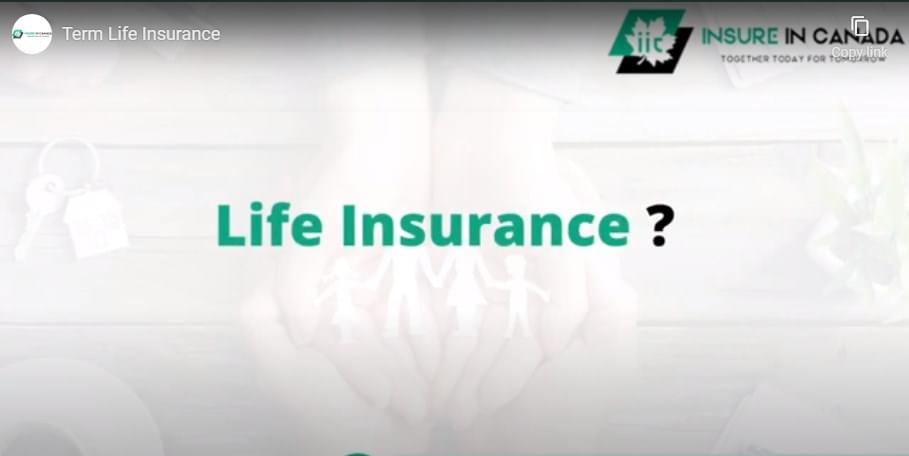Term Life Insurance
Life Insurance Quotes for Term Life
InsureInCanada.ca allows Canadians to compare term life insurance quotes from more than a dozen insurance companies. Because of its affordability and flexibility, this is Canada's most popular type of life insurance.
We have provided a large amount of information below that explains what term life insurance is, who it is designed for, and how it is priced.
Term Life Insurance: An Overview
Term life insurance and permanent life insurance are the two broad categories of life insurance in Canada. However, only one type is available today. The different types of life insurance are described on our page on the different kinds of life insurance. Also known as whole life insurance, permanent life insurance is a type of insurance that lasts a lifetime.
'Term' refers to the length of time. For specific periods, term life insurance premiums are level. In most cases, these policies have premiums that increase at the end of the term period, then are level again for the next term.
Generally, these insurance products differ in how they structure their premiums, not their coverage amounts. In the case of a 10-year term life insurance policy,
How Term Life Insurance Works
Once you understand how term life insurance works, it is straightforward to understand. Term life insurance provides coverage for a specific number of years. If you need life insurance for longer, you should try to match the term length. In Canada, a 10-year term is the shortest available. The fact that life insurance is 100% tax-free is unknown to many Canadians. The policy's beneficiary (typically your spouse, children, or estate) will receive the death benefit if you die before the term ends. One-time, lump-sum payments are made to the beneficiaries as a death benefit.
You have different options if you still need life insurance after the term (e.g. 10 years).
- The policy can be cancelled if you no longer need it at the end of the term.
- After your term life insurance policy expires, most life insurance companies allow you to renew it. You will continue to be able to obtain insurance from the insurance company without submitting a health questionnaire or medical examination. It would help if you were offered another insurance term, regardless of your health. Despite its advantages, this is a costly method. This cost increase will have to be weighed against its value. If you are in terrible health and cannot qualify for a new policy, it may be a good idea to keep your current policy.
- Obtain the lowest possible life insurance rates by submitting a new life insurance application and completing a health questionnaire (and medical examination, if necessary). If approved, you can cancel your old policy and won't have to pay those high renewal premiums. At the end of the term, most people still need life insurance.
- Many life insurance companies offer the option of converting your policy at any time. It is possible to convert term life insurance policies to permanent ones without undergoing a medical examination or filling out questionnaires. Considering this option can be pretty complex, we recommend speaking with Pankaj Bhatia from Insure In Canada.
A term life insurance policy has some benefits.
The most popular type of life insurance is term life insurance because of its many benefits insurance in Canada.
- Inexpensive. All types of life insurance available in Canada are the most affordable. Most life insurance companies offer very competitive rates.
- Tax-Free Benefit. It gives your beneficiaries peace of mind knowing they will receive a tax-free lump sum upon death.
- Guaranteed Rates. There is a guarantee that the rate (cost of the policy) won't change over the policy term (e.g. 10 years, 20 years, 30 years, etc.).
- Customizable.You can customize your policy to meet your and your family's needs, making it ideal for your situation.
- Flexibility.Within the first five years of a 10-year term policy, most life insurance companies allow you to switch to a 20-year term policy. Other options are also available.
- Renewable. Most companies usually offer a renewal option within a life insurance policy.
- Convertible.Most life insurance companies offer a conversion option.
Types of Term Life Insurance
- 10-Year Term Life Insurance
- 15-Year Term Life Insurance
- 20-Year Term Life Insurance
- 25-Year Term Life Insurance
- 30-Year Term Life Insurance
- 40-Year Term Life Insurance
- Term to Age 65 Life Insurance
- Your Term Life Insurance (Provided by RBC Insurance)
- You Can Pick Your Own Term Life Insurance (Offered by Industrial Alliance)
How to calculate Term Life insurance cost and apply
- 1 Enter the essential information to our rate calculator
- 2 Select the quote and review plan details
- 3 Click on the Buy Directly button
- 4 Enter the necessary information and receive a confirmation via email.

How much does term life insurance cost?
Canada's most affordable life insurance is term life insurance. Because humans are living longer and more companies are entering the market, life insurance costs are very competitive in today's market.
Policy costs will increase as the term length increases. A 20-year policy, for instance, costs more than a 10-year policy. The cost of a 30-year policy is higher than that of a 20-year policy
To find out how much this life insurance will cost, we recommend that you use our free online quote. We can also provide you with more information by speaking directly with Pankaj Bhatia Insurance broker.
What is the value of term life insurance?
Some people do not need life insurance. The decision is up to you and your family, based on your situation. If someone financially relies on you, you should buy life insurance. You may refer to your spouse, children (or children), parents, grandparents, friends, business partners, etc.
A good life insurance policy is financially responsible. A loved one's death is a difficult enough experience on its own. With term life insurance, you can give your loved ones the peace of mind they deserve, knowing they won't have to worry about financial worries if you are no longer here tomorrow.
A few examples of term life insurance
A few examples of term life insurance
The scenario
Two young children and a young family in their late 20s have recently purchased a house with a mortgage. The couple seeks life insurance to cover their mortgage debt in the event of death and to provide financial protection for their surviving spouse and children. The parents want coverage until their children are financially independent and their mortgage has been paid off.
Recommendation
Considering a 20-3-0 year term policy would be a good idea.
Here's the scenario
During their late 30s, a couple with young children seeks life insurance to provide financial protection for their surviving spouse and children. Their goal is to have coverage until they are both retired.
Recommendation
It would be wise to consider a term life insurance policy with a term length of 20 years. Level premium policies are also available until 65 years of age, which are another option.
Scenario
They want life insurance coverage until their mortgage is paid, their children have finished post-secondary education, and they are close to retirement.
Recommendation
Considering a policy with a term length of 10 or 15 years may be a good idea.
Scenario
They wish to cover the short-term debt with life insurance, such as a line of credit or a small mortgage balance.
Recommendation
Consider an insurance policy with a 10-year term.
Renewable Option
Term life insurance policies are automatically renewed when they expire. Upon renewal (at a higher premium) for 10 years, the insurance will automatically renew for another 10 years (at a higher premium). Over the last 15 years, renewability has become less of an important feature of these insurance types. Every life insurance company in Canada offers this option. Generally, consumers do not renew their policies because renewal premiums are so high. In the mid-90s, renewal premiums were much lower, so continuing your term policy made more sense than shopping for a new one.
Convertible Option
The ability to convert a term policy remains an essential feature of today's policies. (Up to a certain age) you can convert your convertible term life insurance policy into a permanent policy without having to undergo a medical exam. The waiver of medical evidence can be considered an option for removing medical evidence from the application. Even though you may not use this feature, it is a must-have for worst-case scenarios. What would happen if you have a term life insurance policy and later develop a medical condition that makes you uninsurable? If that is the case, a convertible life insurance policy lets you switch from a term to a permanent policy without undergoing a medical exam. Term life insurance policies from most Canadian companies offer free conversion.
What is the difference between term and whole life insurance?
When purchasing life insurance, it's always a great idea to research to determine the right policy for you, even if term life insurance suits most Canadians.
This insurance provides life insurance coverage for a specific period at an affordable price. A term life insurance policy is for those who need life insurance for a set period, perhaps while they have a young family or if they have high debt levels.
A whole life insurance policy lasts your entire life and does not expire (unlike term life insurance). The whole life insurance policy is yours for life, as long as you keep paying the premiums.
The cash value of a whole life insurance policy can also be viewed as a savings account or investment account. Over time, the cash value will increase in value. There is usually a guaranteed value built into the cash value of whole life insurance policies, so the cash value grows every year- guaranteed (it will never decrease). Different ways of accessing this cash value are available, including withdrawals and loans, which will affect the policy's value.
There is nothing fancy about term life insurance; it's just insurance. Whole life insurance costs more than term life insurance due to its added advantages (lasts your entire life, investment portion, guarantees, etc.). Compared to term life insurance, whole life insurance may cost five to ten times as much (or even more!).
For our clients, term life insurance is more frequently recommended than whole life insurance. This is a highly complex product designed to meet the financial needs of specific individuals. If you want to discuss what is right for you, we highly recommend you speak with Pankaj Bhatia from Insure In Canada.
Life insurance for groups/employers
Many employers offer their employees a group health plan, including life insurance, dental coverage, health benefits, vision care, etc.Life insurance is typically included with these plans if you participate. Because the life insurance is purchased on a group basis with all employees, the rates are discounted (compared to individual term life insurance).
You may be able to get additional coverage from your employer at a discount, but there are a few things to consider.
Temporary Coverage. Usually, this coverage is reduced by half at 65 and expires at a certain age. This coverage won't last the rest of your life.
No Ownership. The policy does not belong to you, so you cannot control its outcome. You will lose life insurance coverage if your employer stops offering benefits. As a result of switching employers, you will usually lose your life insurance coverage.
Low Coverage Amount. Your employer usually provides minimal life insurance coverage, such as $25K or $50K or a multiple of your annual income.

Get the best Insurance Quote from Insure In Canada
Call (647) 640-2222 to speak to our advisors.
Get Quote NowFAQ (Frequently Asked Question )!
Life insurance policies that provide coverage for a fixed period, such as 10 or 30 years, are called term policies. If the policyholder pays the fixed premiums over the term, they will receive a death benefit if they pass away during that time.
Term life insurance should be purchased when you are young and healthy in Canada (and elsewhere). To ensure the most affordable coverage over your set term, lock in your premium rates while you are young and in good health.
When applying for term life insurance, many options are available for other circumstances. Check out our coverage calculator to determine what term life insurance coverage and premiums you qualify for.
It depends on the individual how much term life insurance they need. When determining the size of your benefit, consider how much your dependents will need if you cannot provide for them. You can calculate how much coverage you need by multiplying your annual salary by the number of years left until retirement. Most term life insurance policyholders also purchase additional coverage to replace their income if they cannot pay their debts (including their mortgage).
When accidental death occurs during the coverage period, a term life insurance policy will cover it. Exceptions do exist, however. A skydiving accident, for example, may be excluded from coverage if the insured has a hazardous hobby, such as skydiving.
Disability coverage is not typically included in term life insurance policies. Policyholders can, however, add riders to their term life insurance policies to cover disability, critical illness, and other risks.
Convertible vs. renewable term life insurance
At the end of the term, renewable term life insurance policies automatically renew. In year 11, a 10-year insurance policy will automatically renew for another 10 years (though at a higher premium). These types of insurance were once known for their renewability. Its importance of it has diminished over the past 15 years, however. This option is offered by every single life insurance company in Canada. Consumers are reluctant to pay renewal premiums because they are so high. In the mid-1990s, renewal premiums were much lower, so renewing your term policy made more sense than shopping for a new one.
Term policies today include conversion as a standard feature. You can convert your term life insurance policy into a permanent policy without a medical exam (up to a certain age). Essentially, this is a 'waiver of medical evidence' provision. In some worst-case scenarios, this may not be a feature you intend to use. For example, if you develop a medical condition that renders you uninsurable after purchasing term life insurance. Then you can switch your term policy for a permanent policy without undergoing a medical exam using a convertible insurance policy. Most Canadian life insurance companies offer free conversion with their term policies.
How to Get Started with Term Life Insurance
Looking to purchase term life insurance but don't know where to start? You don't need to worry; Pankaj Bhatia from Insure In Canada is here to help.Get access to instant policy quotes online by visiting our life insurance quote page, where you can learn more about the types of coverage that might be right for you.
We can help you find the right policy from one of Canada's leading insurance providers with in-depth support from one of our expert life insurance agents.

